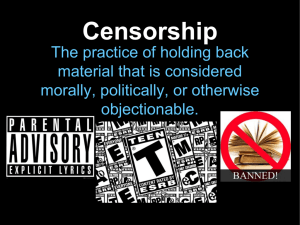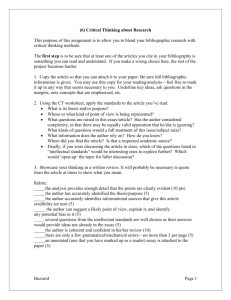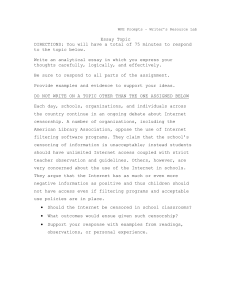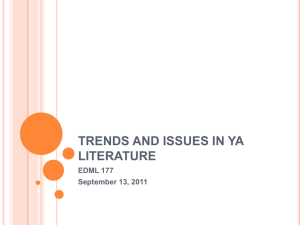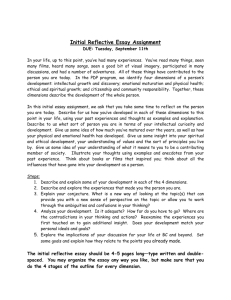Your Right to Read Reading Challenge!
advertisement
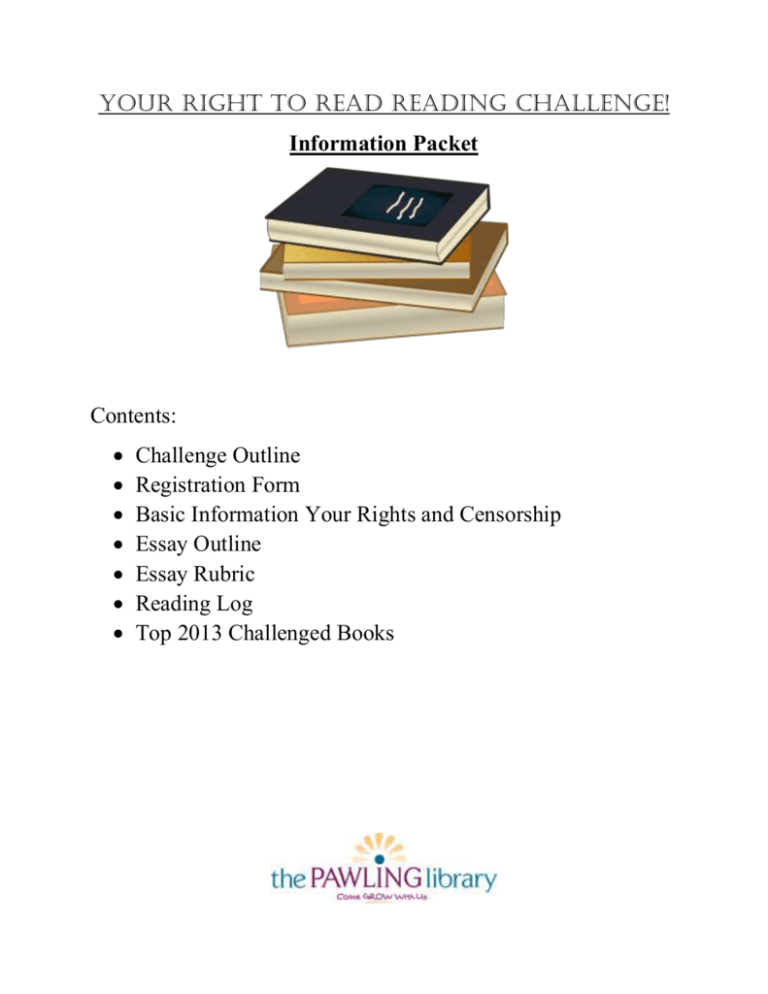
Your Right to Read Reading Challenge! Information Packet Contents: Challenge Outline Registration Form Basic Information Your Rights and Censorship Essay Outline Essay Rubric Reading Log Top 2013 Challenged Books Your Right to Read Reading Challenge! Challenge Outline: The Challenge begins September 8th at 12:00 pm Pick up your Information Packet Fill out your Registration Form Read 2 books of your choice (School reading does not count) Log your 2 books in your Reading Log Research and write your 1-2 page essay Essay Question: The first amendment protects your right to read and have access to information of all kinds. Explain why someone would try to censor your reading and/or information and why it is or is not important to protect your intellectual freedom. (Essay outline and information in packet) Hand in all your work at the library by Saturday, November 8th at 5:00 pm The winner will be announced on Saturday, November 22nd! All essay entries will be allowed to choose a prize from the YA Prize Box. Grand prize is an iPad Mini! For more information and questions, please contact the Teen Programmer, Nicole, at the Pawling Library. Phone: 845-855-3444 Email: teen@pawlinglibrary.org Your Right to Read Reading Challenge! Registration Form DATE: NAME: ADRESS: CITY/STATE: ZIP: PHONE: EMAIL ADRESS: AGE: GRADE: PARENT’S NAME: I HAVE READ THE RULES AND UNDERSTAND THEM Your Right to Read Reading Challenge! READING LOG Two books I chose to read: 1) Title: _____________ Author: _____________ Did you enjoy this book?_________________________________________________________________ 2) Title: _____________ Author: _____________ Did you enjoy this book?_________________________________________________________________ Your Right to Read Reading Challenge! Information: Your Rights and Censorship Some Very Basic Information from The American Library Association (www.ala.org) The First Amendment of the Constitution of the U.S.A.: Congress shall make no law respecting an establishment of religion, or prohibiting the free exercise thereof; or abridging the freedom of speech, or of the press; or the right of the people peaceably to assemble, and to petition the government for a redress of grievances. What Is Intellectual Freedom? Intellectual freedom is the right of every individual to both seek and receive information from all points of view without restriction. It provides for free access to all expressions of ideas through which any and all sides of a question, cause or movement may be explored. Why Is Intellectual Freedom Important? Intellectual freedom is the basis for our democratic system. We expect our people to be self-governors. But to do so responsibly, our citizenry must be well-informed. Libraries provide the ideas and information, in a variety of formats, to allow people to inform themselves. Intellectual freedom encompasses the freedom to hold, receive and disseminate ideas. What Is Censorship? Censorship is the suppression of ideas and information that certain persons—individuals, groups or government officials—find objectionable or dangerous. It is no more complicated than someone saying, “Don’t let anyone read this book, or buy that magazine, or view that film, because I object to it! ” Censors try to use the power of the state to impose their view of what is truthful and appropriate, or offensive and objectionable, on everyone else. Censors pressure public institutions, like libraries, to suppress and remove from public access information they judge inappropriate or dangerous, so that no one else has the chance to read or view the material and make up their own minds about it. The censor wants to prejudge materials for everyone. Your Right to Read Reading Challenge! The Essay Question: The first amendment protects your right to read and have access to information of all kinds. Explain why someone would try to censor your reading and/or information. Then argue why it is or is not important to protect our intellectual freedom. Paper Requirements Answer all parts of the question Support your arguments with evidence, sources or examples Two Pages MAX Single Spaced 12pt Font Name, Date, and title of paper on top Be creative Cite any resource you quote or use on a separate piece of paper Scoring: The highest scoring paper wins. The paper will be graded according to the Common Core 9th grade writing rubric for argumentative essays. 8th grade students will be scored by the “Skilled” column with 5 points automatically added to their score. 7th and 6th grade will be scored by the “Proficient” column. If you are in 6th or 7th grade you will have an automatic 10 pts added to your overall score. There is a max score of 25 points that can be earned by each student. Your Right to Read Reading Challenge! 2013 Most Frequently Challenged Books Out of 307 challenges as reported by the Office for Intellectual Freedom 1. Captain Underpants (series), by Dav Pilkey Reasons: Offensive language, unsuited for age group, violence 2. The Bluest Eye, by Toni Morrison Reasons: Offensive language, sexually explicit, unsuited to age group, violence 3. The Absolutely True Diary of a Part-Time Indian, by Sherman Alexie Reasons: Drugs/alcohol/smoking, offensive language, racism, sexually explicit, unsuited to age group 4. Fifty Shades of Grey, by E.L. James Reasons: Nudity, offensive language, religious viewpoint, sexually explicit, unsuited to age group 5. The Hunger Games, by Suzanne Collins Reasons: Religious viewpoint, unsuited to age group 6. A Bad Boy Can Be Good for A Girl, by Tanya Lee Stone Reasons: Drugs/alcohol/smoking, nudity, offensive language, sexually explicit 7. Looking for Alaska, by John Green Reasons: Drugs/alcohol/smoking, sexually explicit, unsuited to age group 8. The Perks of Being a Wallflower, by Stephen Chbosky Reasons: drugs/alcohol/smoking, homosexuality, sexually explicit, unsuited to age group 9. Bless Me Ultima, by Rudolfo Anaya Reasons: Occult/Satanism, offensive language, religious viewpoint, sexually explicit 10. Bone (series), by Jeff Smith Reasons: Political viewpoint, racism, violence
